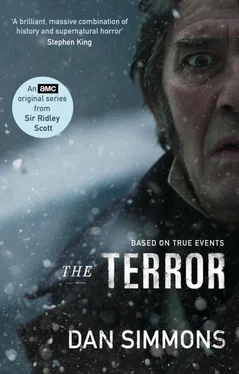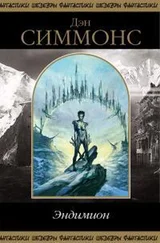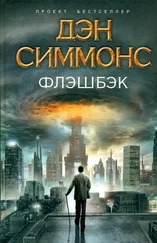The woman next to him is carrying his child.
Of all his failures, it is Francis Crozier’s failures as a man which hurt and haunt him the most.
He is almost fifty-three years old and he has loved only once before this — proposing marriage to a spoiled child, a mean-spirited girl-woman who had teased him and then used him for her pleasure the way his sailors used dockside chippies. No , he thought, the way I used dockside chippies .
Every morning now and often in the night he awakens next to Silence after sharing her dreams, knowing that she has shared his, feeling her warmth against him, feeling himself responding to that warmth. Every day they go out into the cold and fight for life together — using her craft and knowledge to prey on other souls, to eat other souls, so that their two lifespirit souls can live awhile longer.
She is carrying our child. My child .
But that is irrelevant to the decision he must make in the next few days.
He is almost fifty-three years old and he is now being asked to believe in something so preposterous that the very thought of it should make him laugh. He is asked — if he understands the strings and the dreams, and he believes he does at long last — to do something so terrible and so painful that if the experience does not kill him, it may drive him mad.
He has to believe that such counter-intuitive insanity is the right thing to do. He has to believe that his dreams — mere dreams — and that his love for this woman should make him surrender a lifetime of rationality to become…
Become what?
Someone and something else.
Pulling the sledge next to Silence under a sky filled with violent color, he reminds himself that Francis Rawdon Moira Crozier believes in nothing.
Or rather, if he believes in anything, it is in Hobbes’s Leviathan .
Life is solitary, poor, nasty, brutish, and short .
This cannot be denied by any rational man. Francis Crozier, in spite of his dreams and headaches and strange new will to believe, remains a rational man.
If a man in a smoking jacket in a coal-fire-heated library in his manor house in London can understand that life is solitary, poor, nasty, brutish, and short, then how can it be denied by a man pulling a sledge stacked with frozen meat and furs across an unnamed island, through the arctic night under a sky gone mad, toward a frozen sea a thousand miles and more from any civilized hearth?
And toward a fate too frightening to imagine.
On their fifth day pulling along the coast, they come to the end of the island and Silence leads them northeast out onto the ice. The going is slower here — there are the inevitable pressure ridges and shifting floes — and they have to work much harder. They also travel more slowly so as not to break the sledge. They use their blubber stove to melt snow for drinking water but do not pause to catch fresh meat, despite the many breathing-hole domes Silence points out in the ice.
The sun now rises for thirty minutes or so each day. Crozier cannot be sure of the time. His watch disappeared with his clothing after Hickey shot him and after Silence rescued him… however she did that. She has never told him.
That was the first time I died , he thinks.
Now he is being asked to die again — to die as what he was in order to become something else.
But how many men get such a second chance? How many captains who have watched one hundred twenty-five men in their expedition die or disappear would want it?
I could disappear .
Crozier has seen the mass of scars on his arm, chest, belly, and leg each night when he strips to crawl beneath the sleeping robes, and he can feel and imagine how terrible the bullet and shotgun-pellet scars are on his back. They could be an explanation and excuse for a lifetime of silence about his past.
He can hike east across Boothia, hunt and fish in the rich, warming waters off the east coast there, hide from Royal Navy and other English rescue ships, and wait for an American whaling ship. If it takes two or three years there before one comes, he can survive that long. He is sure of it now.
And then, instead of going home to England — has England ever been home for him? — he can tell his American rescuers that he has no memory of what has happened to him or what ship he belonged to — he can show his terrible wounds as evidence — and go to America with them at the end of the whaling season. There he can start a new life.
How many men get a chance to start such a new life at his age? Many men would want to.
Would Silence go with him? Would Silence bear the stares and laughter of sailors and the harsher stares and whispers of “civilized” Americans in some New England city or New York? Would she trade her furs in for calico dresses and whalebone corsets, knowing that she would always be the ultimate stranger in the ultimate strange land?
She would.
Crozier knows this as surely as he knows anything.
She would follow him there. And she would die there — and die soon. Of misery and of the strangeness and of all the vicious, petty, alien, and unbridled thoughts that would pour into her like the poison from the Goldner tins poured into Fitzjames — unseen, vile, deadly.
He knows this as well.
But Crozier could raise his son in America and have a new life in that almost-civilized country, perhaps captain a private sailing ship there. He has been a total failure as a Royal Navy and Discovery Service captain and as an officer and as a gentleman — well, he was never a gentleman — but no one in America would ever need to know that.
No, no, a serious sailing ship would take him to places and ports where he might be known. If he is recognized by any English Naval officer, he would be hanged as a deserter. But a small fishing ship… fishing out of some small New England harbour village, perhaps, with an American wife waiting in port to raise his child with him after Silence dies.
An American wife?
Crozier glances at Silence straining in the sledge harness to his right, pulling with him. The crimson and red and purple and white light from the aurora overhead paints her furred hood and shoulders. She does not look at him. But he is sure that she knows what he is thinking. Or if she does not know now, she will when they curl up together later in the night and dream.
He cannot go home to England. He cannot go to America.
But the alternative…
He shivers and pulls his hood forward so that the polar-bear fur on either side of his face can better capture the warmth of his breath and body.
Francis Crozier believes in nothing. Life is solitary, poor, nasty, brutish, and short . It has no plan, no point, no hidden mysteries that make up for the oh-so-obvious miseries and banalities. Nothing he has learned in the last six months has persuaded him otherwise.
Has it?
Together, they pull the sledge farther out onto the pack ice.
On the eighth day they stop.
This place looks no different than most of the other pack ice they have crossed in the previous week — a bit flatter, perhaps, fewer large ice blocks and pressure ridges, perhaps, but essentially just pack ice. Crozier can see a few small polynyas in the distance — their dark water like blemishes in the white ice — and the ice has broken up here and there into several small, impermanent going-nowhere leads. If the spring breakup is not actually coming two months earlier this year, it is doing a good impersonation of it. But Crozier has seen such false spring thaws many times before in his arctic experience and knows that the real breakup of pack ice will not begin until late April or later.
In the meantime, they have patches of open water and seal breathing holes galore, perhaps even the chance to hunt walrus or narwhal should they appear, but Silence is not interested in hunting.
Читать дальше








